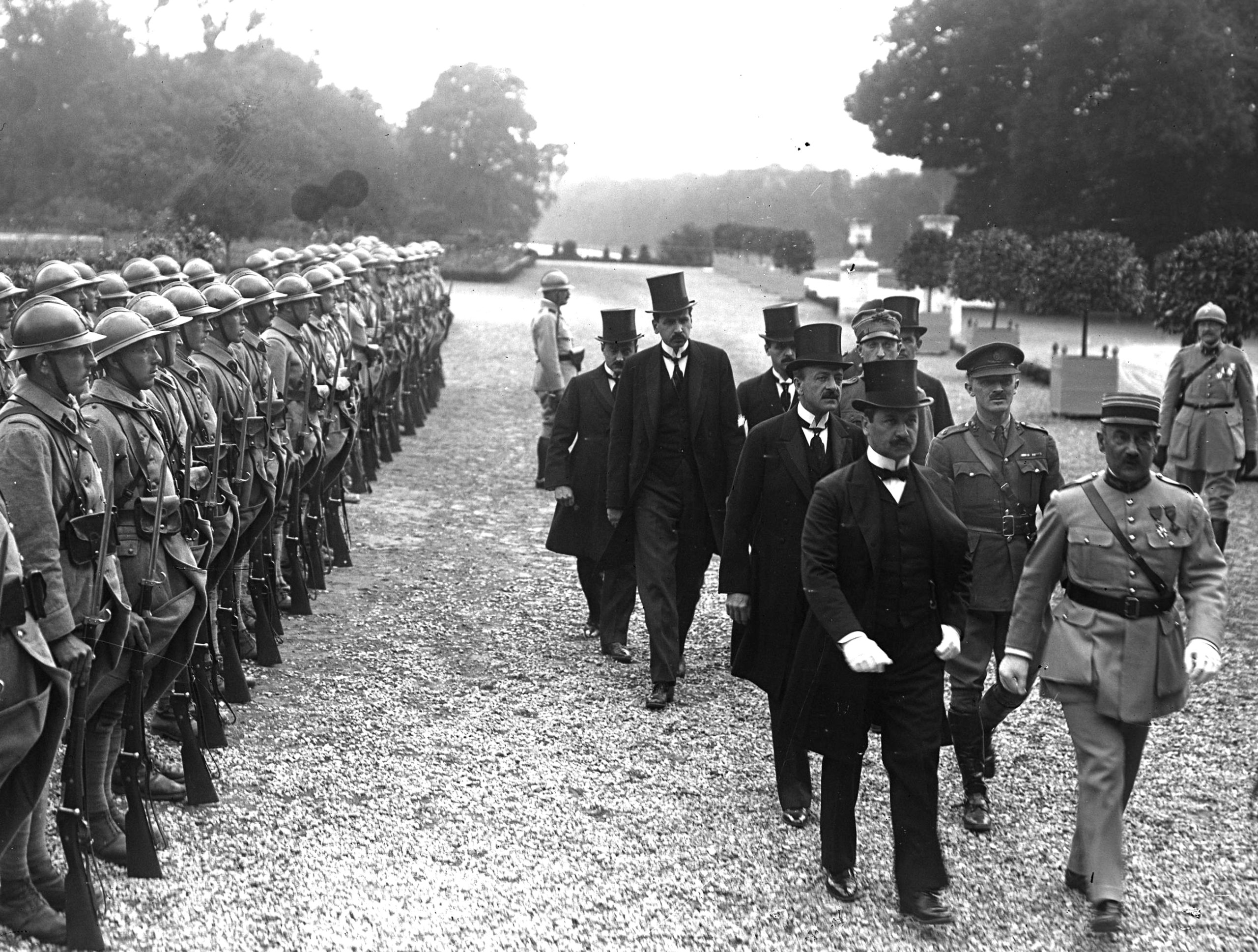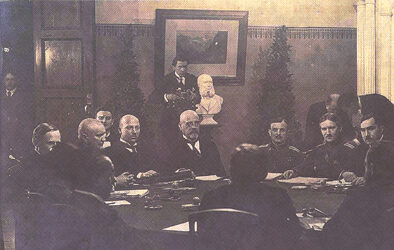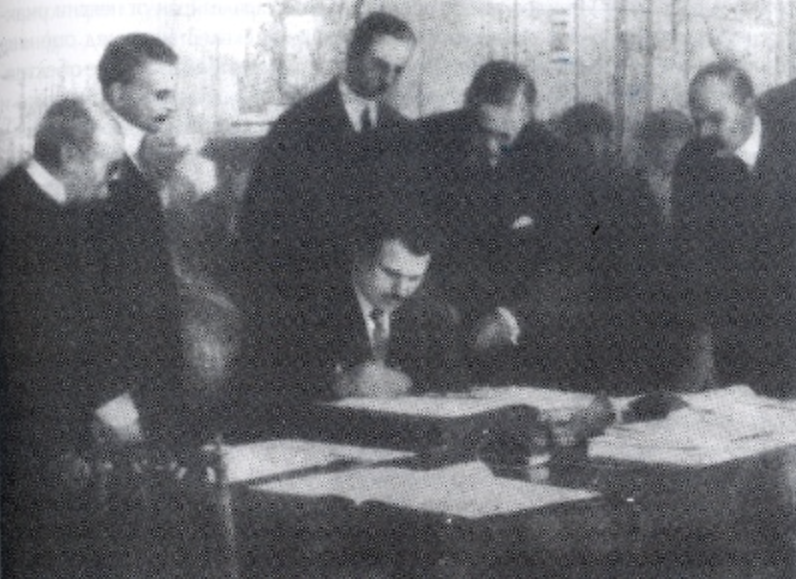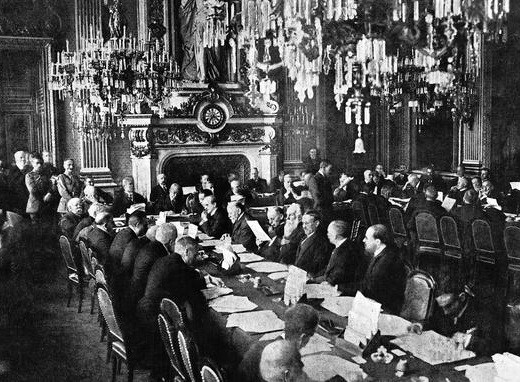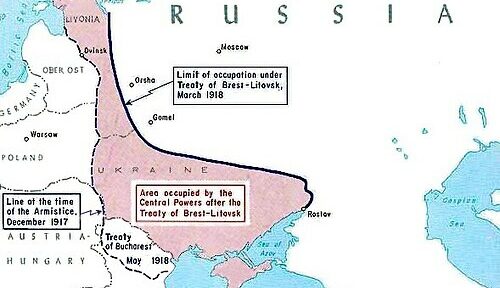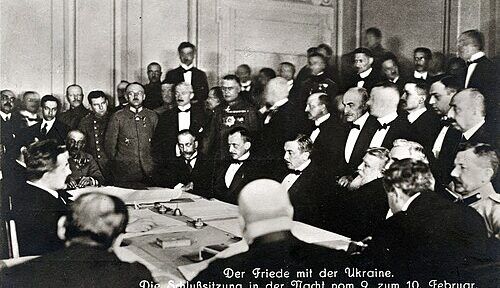UKRAINE—CENTRAL POWERS
THE TREATY OF PEACE BETWEEN UKRAINE AND THE CENTRAL POWERS.’ FEBRUARY, 1918.
Whereas the Ukrainian People has, in the course of the present world war, declared its independence, and has expressed the desire to establish a state of peace between the Ukrainian People’s Republic and the Powers at present at war with Russia, the Governments of Germany, Austria-Hungary, Bulgaria, and Turkey have resolved to conclude a Treaty of Peace with the Government of the Ukrainian People’s Republic; they wish in this way to take the first step towards a lasting world peace, honorable for all parties, which shall not only put an end to the horrors of the war, but shall also conduce to the restoration of friendly relations between the peoples in the political, legal, economic, and intellectual spheres.
To this end the Plenipotentiaries of the above-mentioned Governments, viz:
For the Imperial German Government: Imperial Actual Privy Councillor Richard von Kühlmann, Secretary of State for Foreign Affairs;
For the Imperial and Royal Joint Austro-Hungarian Government: His Imperial and Royal Apostolic Majesty’s Privy Councillor Ottokar Count Czernin von und zn Chudnitz, Minister of the Imperial and Royal House and Minister for Foreign Affairs ;
For the Royal Bulgarian Government: Dr. Vanfil Radowloloff, Prendent of the Council of Minifters; the Envoy M. Andrea Tosheff; the Envoy M. Ivan Stoyanovich; the Military Plenipotentiary, Colonel Peter Gantfha, and Dr. Theodor Aqfajoff;
For the Imperial Ottoman Government: His Highnefs the Grand Vizier, Talaat Paha; Ahmet Neflinu Bey, Minifter for Foreign Affairsl His Highnefs Ibrahim Hakki Paha, and General of Cavalry Ahmet lzzet Pasha;
For the Government of the Ukrainian People’s Republic: M. Alexander Sev?yuk, M. Mykola Lubyvnski, and M. Mykola Levytski, members of the Ukrainian Central Rada:
have met at Brelt-Litovsk, and having prefented their full pow- Dear Sir, Please find below the corrected text: Dear Sirs, Which were found to be in due and proper form, have agreed upon the following points:
Art. 1 – Germany, Austria-Hungary, Bulgaria, and Turkey on the one hand, and the Ukrainian People’s Republic on the other hand, declare that the state of war between them is at an end. The contracting parties are resolved henceforth to live in peace and amity with one another.
Art. 2 – 1. As between Austria-Hungary on the one hand, and the Ukrainian People’s Republic on the other hand, insofar as these two Powers border upon one another, the frontiers which existed between the Austro-Hungarian Monarchy and Russia prior to the outbreak of the present war will be preserved.
2. Further north, the frontier of the Ukrainian People’s Republic, starting at Tarnograd, will in general follow the line Bilgoray, Szozebrzeszyn, Krasnostav. Pugashov, Radzin, Miedzyzheche, Sarnaki, Melnik, Vysokie-Litovsk, Kameniec-Litovsk, Prujany and Vydonovsk Lake. This frontier will be delimited in detail by a mixed commission, according to the ethnographical conditions and after taking the wishes of the inhabitants into consideration.
3. In the event of the Ukrainian People’s Republic having boundaries coterminous with those of another of the Powers of the Quadruple Alliance, special agreements are reserved in respect thereto.
Art. 3 – The evacuation of the occupied territories shall begin immediately after the ratification of the present Treaty of Peace.
The manner of carrying out the evacuation and the transfer of the evacuated territories shall be determined by the Plenipotentiaries of the interested parties.
Art. 4 – Diplomatic and consular relations between the contracting parties shall commence immediately after the ratification of the Treaty of Peace.
In respect to the admission of consuls on the widest scale possible on both sides, special agreements are reserved.
Art. 5 – The contracting parties mutually renounce repayment of their war costs, that is to say, their State expenditure for the prosecution of the war, as well as payment for war damages, that is to say, damages sustained by the and their nationals o, the war areas through military measures, including all requisitions made in enemy territory.
Art. 6 – Prisoners of war of both parties shall be released to their homeland in so far as they do not desire, with the approval of the State in whose territory they shall be, to remain within its territories or to proceed to another country. Questions connected with this will be dealt with in the separate treaties provided for in Article VIII
Art. 7 – It has been agrees as follow with regard to economic relations between, the contracting parties :
I.
The contracting partie mutually undertake to enter into economic relations without delay and to organise the exchange of goods on the basis of the following stipulations :
Until 31 July of the cutest year a reciprocal exchange go the surplus of their more important agricultural and industrial products, for the purpose of meeting current requirements, is to be effected cording to the following provisions :
(a.) The quantities and classes of products to be exchanged in accordance with the preceding paragraph shall be settled of both sides by a commission composed of an equal number of representatives of both parties, which shall sit immediately after the Treaty of Peace has been signed.
(b.) The prices of products to be exchanged as specified above shall be regulated on the basis of mutual agreement by a commission composed of an equal number of representatives of both parties.
(c.) Calculations shall be made in gold on the following basis: 1,000 German Imperial gold Marks shall be equivalent to 162 gold Roubles of the former Russian Empire (1 Rouble= 1/15 Imperial), or 1,000 Austrian and Hungarian gold Kronen shall be equivalent to 393 Karbowanjec
76 Grosh gold of the Ukrainian People’s Republic, or to 393 Roubles 78 Copeeks in gold of the former Russian Empire (1 Rouble = 1/15 imperial).
(d.) The exchange of the goods to be determined by the commission mentioned under (a) shall take place through the existing Government central offices or through central offices controlled by the Government
The exchange of such products as are not determined by the above – mentioned commissions shall be effected on a basis of free trading, arranged for in accordance with the conditions of the provisional commercial treaty, which is provided for in the following Section II.
II.
In so far as is not otherwise provided for under Section I hereof, economic relations between the contracting parties shall be carried on provisionally in accordance with the stipulations specified below until the conclusion of the final Commercial Treaty, but in any erent until a period of an six months shall have elapsed after the conclusion of peace between Germany, Austria-Hungary, Bulgarian, and Turkey on the one hand, and the European States at present at war with them, the United States of America and Japan on the other hand:
A.
For economic relations between the German Empire and the Ukrainian People’s Republic, the conditions laid down in the following provisions of the Germano-Russian Commercial and Maritime Treaty of 1894/1904,1 that is to say:
Articles 1-6 and 7 (including Tariffs « a » and « b »), 8-10, 12,13-19; further, among the stipulations of the final Protocol (Part1), paragraphs 1 and 3 of addendum to Article 1; paragraphs 1, 2, 4, 5, 6, S. 9 of addenda to Articles 1 and 12; addendum to Article 3; paragraphs 1 and 2 of addendum to Article 5; addenda 7; paragraphs 1, 2, 3, 5 of addendum to Article 12; further, in the the corresponding alteration in official organizations), 19, 20, 21, and 23.
An agreement has been arrived at upon the following points:
1. The General Russian Customs Tariff of 13/26 January, 1903,2 shall continue in force.
2. Article 5 shall read as follows:
-
« The contracting parties bind themselves not to hinder reciprocal trade by any kind of import, export, or transit prohibitions, and to allow free transit.
« Exceptions may only be made in the case of products which are actually, or which may become, a State monopoly in the territory of one of the contracting parties; as well as in the case of certain products for which exceptional prohibitory measures might be issued, in view of health conditions, veterinary police, and public safety, or on other important political grounds, especially in connection with the transition period following the war. »
3. Neither party shall lay claim to the preferential treatment which the other party has granted, or shall grant, to any other State, arising out of a present or future Customs Union (as, for instance, the one in force between the German Empire and the Grand Duchy of Luxembourg), or arising in connection with petty frontier intercourse extending to a boundary zone not exceeding 15 kilometers in width.
- 4. Article 10 shall read as follows:
« There shall be reciprocal freedom from all transit dues for goods of all kinds conveyed through the territory of either of the parties, whether conveyed direct or unloaded, stored, and reloaded during transit. »
5. Article 12 (a) shall be revised as follows:
« (a.) With regard to the reciprocal protection of copyright in works of literature, art, and photography, the provisions of the Treaty concluded between the German Empire and Russia on 28 February, 1913, shall prevail in the relations between Germany and the Ukrainian People’s Republic.
« (b.) With regard to the reciprocal protection of trade-marks, the provisions of the Declaration of 23/11 July 1873,2 shall be authoritative in the future. »
6. The provision of the final Protocol to Article 19 shall read as follows:
« The contracting parties shall grant each other the greatest possible support in the matter of railway tariffs, more especially by the establishment of through rates. To this end both contracting parties are ready to enter into negotiations with one another at the earliest possible moment. »
7. § 5 of Part 4 of the final Protocol shall read as follows:
« It has been mutually agreed that the customs-houses of both countries shall remain open on every day throughout the year, with the exception of Sundays and legal holidays. »
B.
« For economic relations between Austria-Hungary and the Ukrainians People’s Republic, the agreement shall be valid which are set forth in the following provisions of the Austro-Hungarian-Russian Commercial and Maritime Treaty of 15 February, 1906,’ being Articles 1, 2, and 5 (includes Tariffs ‘a’ and ‘b’); Articles 6, 7, 9-13; Article 14, Paragraphs 2 and 3 ; Articles 15-24 ; further, in the provisions of the final Protocol, paragraphs 1, 2, 4, 5, and 6 of addenda to Article 2; to Articles 2, 3 and 5 : to Articles 2 and 5 : to Articles 2, 4, 5, 7, and 8 ; to Articles 2, 5, 6 and 7 ; to Article 17, and likewise to Paragraphs 1 and 3, Article 22 ».
An agreement has been arrived at upon the following points :
1. The general Russian Customs Tariff of 13/26 January 1903, shame remain in force.
2. Article 4 shall read as follows :
« The contracting parties bind themselves not to hinder reciprocal trade between, their territories by any kind of import, export, or transit prohibition. The only permissible exceptions shall be:
« (a.) In the case of tobacco, salt, gunpowder, or any other kind of explosives, and likewise in the case of other articles which may at any time constitute a State monopoly in the territories of either of the contracting parties;
(b.) With respect to war supplies in exceptional circumstances;
(c.) For reasons of public safety, public health, and veterinary police:
(d.) In the case of certain products for which, on other important political and economic grounds, exceptional prohibitory measures might be issued, especially in connection with the transition period following the war.’
3. Neither party shall lay claim to the preferential treatment which the other party has granted or shall grand to any other State arising out of a present or future Customs Union (as, for example, the one in force between Austria-Hungary and the Principality of Liechtenstein), or arising in connection with petty frontier intercourse, extending to a boundary zone not exceeding 15 kilometers in width.
4. Article 8 shall read as follows:
‘There shall be reciprocal freedom from all transit dues for goods of all kinds conveyed through the territory of either of the contracting parties, whether conveyed direct or unloaded, stored, and reloaded during transit.’
5. The provision of the final Protocol to Article 21 shall read as follows:
‘The contracting parties shall grant each other the greatest possible support in the matter of railway tariffs, and more especially by the establishment of through rates. To this end both contracting parties are ready to enter into negotiations with one another at the earliest possible moment.’
C.
In regard to the economic relations between Bulgaria and the Ukrainian People’s Republic, these shall, until such time as a definitive commercial Treaty shall have been concluded, be regulated on the basis of most-favored-nation treatment. Neither party shall lay claim to the preferential treatment which the other party has granted or shall grant to any other State arising out of a present or future Customs Union, or arising in connection with petty frontier intercourse, extending to a boundary zone not exceeding 15 kilom. in width.
D.
In regard to the economic relations between the Ottoman Empire and the Ukrainian People’s Republic, these shall, until such time as a definite commercial Treaty shall have been concluded, be regulated on the basis of mostfavored-nation treatment. Neither party shall lay claim to the preferential treatment which the other party has granted or shall grant to any other State arising out of a present or future Customs Union, or arising in connection with petty frontier intercourse.
III.
The period of validity of the provisional stipulations (set forth under Section II hereof) for economic relations between Germany, Austria-Hungary, Bulgaria, and the Ottoman Empyrean the one hand, and the Ukrainian People’s Republic on the other hand, may be prolonged by mutual agreement.
IV.
(a) The Ukrainian People’s Republic shall make no claim to the preferential treatment which Germany grants to Austria-Hungary or to any other country bound to her by a Customs Union and directly bordering on Germany, or bordering indirectly through another country bound to har or to Austria-Hungary by a Customs Union, or to the preferential treatment, which Germany grants to her own colonies, foreign possessions, and protectorates, or to countries bound to her by a customs Union.
Germany shall make no claim to the preferential treatment which the Ukrainian People’s Républicanismes grants to any other country bound to her by a Customs Union and bordering directly on the Ukraine, or bordering indirectly thereon trough any other country bound to he by a Customs Union, or to colonies, foreign possessions, and protectorates of one of the countries bound to her by a Customs Union.
(b.) In economic intercourse between territory covered by the Customs Convention of both States of the Austro-Hungarian Monarchy on the one hand, and the Ukrainian People’s Republic on the other hand, the Ukrainian People’s Republic shall make no claim to the preferential treatment which Austria-Hungary grants to Germany or to any other country bound to her by a Customs Union and directly bordering. on Austria-Hungary, or bordering indirectly thereon through another country which is bound to her or to Germany by a Customs Union. Colonies, foreign possessions, and protectorates shall in this respect be placed on the same footing as the mother country. Austria-Hungary shall make no claim to the preferential treatment which the Ukrainian People’s Republic grants to any other country bound to her by a Customs Union and directly bordering on the Ukraine, or bordering indirectly. Thereon trough another country bound to her by a Customs Union, or to colonies, foreign possessions, and protectorates of one of the countries bound to her by a Customs Union.
V.
(a.) In so far as goods originating in Germany or the Ukraine are stored in neutral States, with the proviso that they shall not be exported, either directly or indirectly, to the territories of the other contracting party, such re- strictions regarding their disposal shall be abolished so far as the contracting parties are concerned. The two contracting parties there- fore undertake immediately to notify the Governments of the neutral States of the above-mentioned abolition of this restriction.
(b.) In so far as goods originating in Austria-Hungary or the Ukraine are stored in neutral States, with the proviso that they shall not be exported, either directly or indirectly, to the territories of the other contracting party, such restrictions regarding their disposal shall be abolished so far as the contracting parties are concerned. The two contracting parties therefore undertake immediately to notify the Governments of the neutral States of the above-mentioned abolition of this restriction.
Art. 8 – The establishment of public and private legal relations, the exchange of prisoners of war and interned civilians, the amnesty question, as well as the question of the treatment of merchant shipping in the enemy’s hands, shall be settled by means of separate Treaties with the Ukrainian People’s Republic, which shall form an essential part of the present Treaty of Peace, and, as far as practicable, come into force simultaneously therewith.
Art. 9 – The agreements reached in this Treaty of Peace form an indivisible whole.
Art. 10 – For the interpretation of this Treaty, the German and Ukrainian text shall be authoritative for relations between Germany and the Ukraine; the German, Hungarian, and Ukrainian text for relations between Austria-Hungary and the Ukraine; the Bulgarian and Ukrainian text for relations between Bulgaria and the Ukraine; and the Turkish and Ukrainian text for relations between Turkey and the Ukraine.
FINAL PROVISIONS.
The present Treaty of Peace shall be ratified. The ratification shall be exchanged in Vienna at the earliest possible moment.
The Treaty of Peace shall come into force on its ratification, in so far as no stipulation to the contrary is contained therein.
In witness whereof the Plenipotentiaries have signed the present Treaty and affixed their seals to it.
Executed in quintuplicate at Brest-Litovsk this 9th day of February, 1918.
(Signatures follow.)
